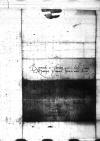List #5709
Sigismund I Jagiellon do Ioannes DANTISCUSWielowieś, 1543-12-12
| odebrano Heilsberg (Lidzbark Warmiński), 1544-02-08 Rękopiśmienne podstawy źródłowe:
Pomocnicze podstawy źródłowe:
| ||||||||||
Tekst + aparat krytyczny + komentarzZwykły tekstTekst + komentarzTekst + aparat krytyczny
Reverendo in Christo Patri, domino
Reverende in Christo Pater, sincere nobis dilecte.
Ex litteris, quas ad nos proxime dedit Paternitas Vestra, singularem illius in causa
Bene valeat Paternitas Vestra.
Datum in
Commissio propria regiae maiestatis


 BNW, BOZ, 953, f. 227v
BNW, BOZ, 953, f. 227v